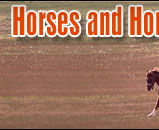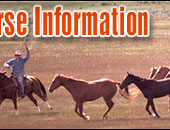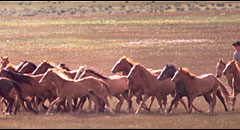 |
   |
|
|
|
You are here: Horses > Horse pasture / forage > Using herbicides |
Herbicidal Advantage
As a horse owner, you keep a close eye on your pasture to ensure that your
horses will forage for high quality, nutritious, and also healthy feed.
Obviously you will have the occasional unwanted plants and weeds that grow up
among the grasses and red clover that you might have specifically sown for your
horses.
|
|
|
Yet did you know that weeds have little if any
nutritional value for your horses? Some of them may even be
poisonous and cause severe problems for your animals if they
are ingested, especially in larger quantities. In addition
to the foregoing, weeds will also eventually choke out the
desired grasses and legumes that you have planted by
competing for soil nutrients, moisture and even sunlight.
It has long been held that a healthy stand will provide the
single best defense against weeds that you could have, and
any horse owner will be wise to adequately |
fertilize pastures with the key ingredients they need to keep the grass healthy
and thriving. Yet there is the chance that even the best looked after pasture
suddenly finds itself overrun by weeds, and when this happens to you, only
back-breaking labor or wisely applied herbicides will restore your pastures to
their original status.
Unless you want to go ahead and pull every single weed you can find, you will
find that there is a wide variety of herbicides that are specifically formulated
for the use in pastures. Many of them are created with the environment in mind,
and will not add any poisons to your lakes, rivers, and other bodies of water
during a run off. Read the back of the bags to ensure that you are purchasing
the correct herbicide for the job. Some work better on one kind of weed, while
others are specifically manufactured to tackle a different one. Thus, you may
not be able to battle musk thistle with just any herbicide. The same also holds
true for chickweed and wild carrot.
Some herbicides will have stringent grazing restrictions that will require you
to keep your horses off the pasture for about one to two weeks. Other compounds
specifically state you may allow your animals back out onto the pasture after
application of the compounds; this is especially important to know for lactating
animals and their foals. Consider if you wish to apply your herbicide in a broad
pattern or if you just need to treat some problem spots that might have come up
during the last rains. Once again, the manufacturers’ labels will hold most
valuable information for you.
 |
Read the next horse pasture article on How Many Horses
are In the United States? |
|
|
|
|
 |
|
|
|
|
|
Horse Education
|
|
|
|
|
Horse Information Topics
|
|
|
|
|
|
|
|
Horse Business Owners
|
| |
Advertise with Us
Have your horse products or services exposed to over 27,000 of our monthly visitors.
|
|
|
|
|
|